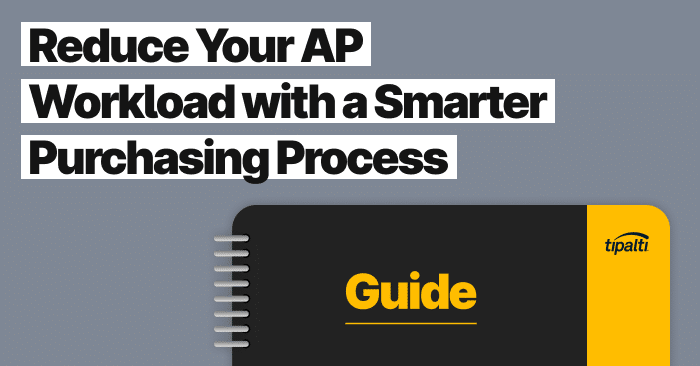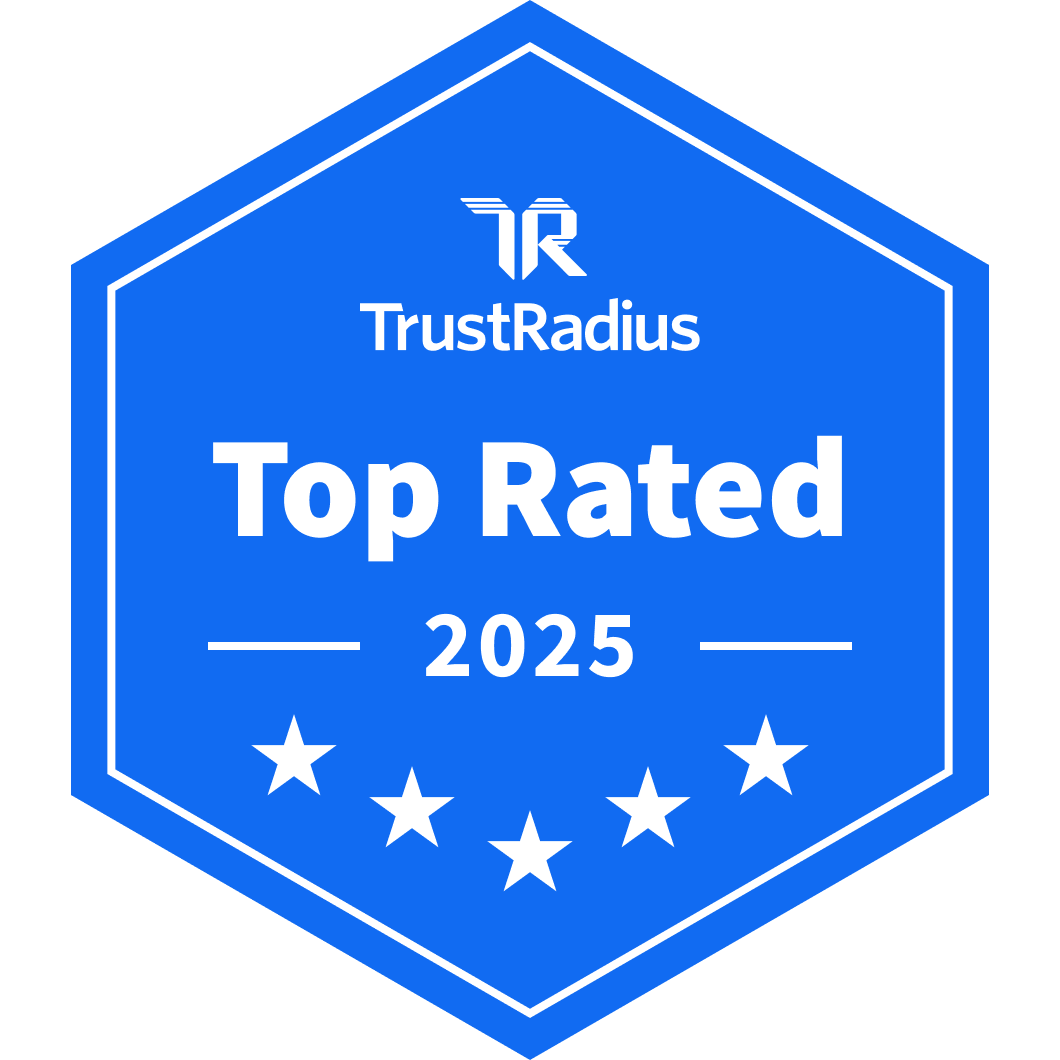
Ready to modernize your purchasing process and reduce your AP workload through automation? Let’s dive in.
Fill out the form to get your free eBook.

If you’ve outgrown your purchasing process you probably notice unnecessary delays, friction, and clunky approvals. Not only does it hold back your daily purchasing efforts, but it creates more work overall for AP. By streamlining your purchasing process you can overcome the messy approvals, bottlenecks, and limited visibility that come with an outdated process. It also means AP can say goodbye to surprise invoices and late payments. Download the eBook and discover:
- How to recognize the signs you’ve outgrown your purchasing process
- How to design a modern purchasing process that allows AP to get involved earlier in purchasing decisions
- How to launch this process quickly and seamlessly
Procurement software helps create more streamlined processes and improves spend visibility and supplier management by creating a single source of truth for hosting procurement information.
This guide defines procurement software, lists and describes some of the best procurement software solutions, and explains the types and benefits of procurement software and how it works.
What is Procurement Software?
Procurement software is computer and mobile device programs that increase the efficiency of the supply chain process by automating certain tasks such as finding and working with suppliers, purchasing goods or services, maintaining inventory, and communicating with vendors.
Known occasionally as purchasing management software—a procurement software solution is a cloud based solution that manages a supply chain by hosting all the steps of the purchasing process digitally. E-procurement software solutions help keep the purchasing process organized and streamlined, in a unified procurement system. It also facilitates procurement audits.
Top 9 Procurement Software
Here is a list of procurement software vendors to consider for automating your procurement operations.
1. Tipalti
Process coverage
Supplier management, procurement, invoice management, payment remittance-reconciliation, tax compliance, accounts payable automation. Automated procurement management, streamlined approval process, and real visibility.
Integrations
Oracle NetSuite, Sage Accounting, Sage Intacct, QuickBooks, Microsoft Dynamics, SAP HANA/Business One/BusinessByDesign, Acumatica, Xero Accounting, Performance marketing, and custom integrations (integration with all ERPs or accounting software and several performance marketing platforms)
Pricing
For details on Tipalti pricing, get in contact with their specialists.
Customers
Jumio: Automated multi-entity purchase orders, bill processing, and payments for 300,000+ invoices per month, with self-service supplier onboarding and global scalability. Reduced procurement and accounts payable workload by 80%. Speeded the monthly accounting close reconciliation by 25%.
Taboola: Automated the entire PR to PO process. Automated supplier onboarding and centralized supplier communications. Gained visibility into current suppliers for better supplier management.
TIER Mobility: Customized PRs and POs for specific subsidiaries in its multi-entity use. Provided total spend visibility to procurement and finance teams. Adopted a system that is scalable for growth with intelligent procurement data management.
How do you manage the purchasing lifecycle in a short amount of time?
Tipalti offers an intuitive, customizable purchasing journey to eliminate manual processes and ease stress.


2. Precoro
Process coverage
Purchase requests, purchase orders, approval workflow, reporting, budget management, supplier management, inventory- 3-way match, expense management
Integrations
NetSuite, QuickBooks Online, Xero, SSO (single sign-on) with key identity providers, APIs for automated data exchange with popular accounting/business tools (including Amazon Business PunchOut)
Pricing
20 users or less: $35/user/month billed annually. Contact Precoro on pricing for >20 users.
Customers
Bright Peak Therapeutics: Startup with no procurement workflow streamlined procurement operations, eliminated costly errors from invoice duplication and delayed payments.
TESTEX: Began processing orders three times faster and accelerated approval workflow by 100% after one month.
PassportCard: Built an automated procurement process with a flexible approval workflow for multiple companies and locations in less than a year.
Cheerz: Employed direct connection to Sage to automate largely manual processes. Broad acceptance from a simple, intuitive user interface.
3. Procurify
Process coverage
Customizable approvals, purchasing workflow, real-time customizable budgets, expense management, physical-virtual spending cards, vendor and catalog management, mobile app, in-platform communication, recurring spend management, audit logs, analytics, and reporting.
Integrations
NetSuite, QuickBooks Online, QuickBooks Desktop, Sage Intacct, Microsoft Dynamics 365 Business Central, Amazon PunchOut, Slack, API Connection, Staples PunchOut, Import-export CSV-Excel files
Pricing
All-in-one platform pricing starts at $2,000, depending on the number of users, complexity, and integration needs, with custom pricing.
Customers
Cabify: Enabled a more efficient software procurement process, with expanded cloud-based capabilities, easy to use, and integrated with its accounting program, NetSuite.
Wren Therapeutics: Simplified core procurement processes for generating POs and approving orders more quickly.
Chai Lifeline: Moved from paper forms to digital requests and records to streamline procurement and eliminate errors. Adopted Procurify’s integrations to QuickBooks and Amazon PunchOut.
St. Anthony High School: Eliminated paper purchase orders and enabled proactive budget management.
4. Teampay
Process Coverage
Teampay provides an extensive spend management and procurement solution that offers features for purchase requests, approval workflows, expense management, budgeting, and more. The system streamlines the process of tracking and managing company spend, ensuring compliance and automating manual work.
Integrations
QuickBooks, NetSuite, Xero, SAP, MS Dynamics, Stripe, PayPal, Brex, Expensify, Google Drive, Dropbox.
Pricing
Teampay offers customized pricing based on business size and needs. Typically, companies can expect to pay a monthly or annual subscription fee, with pricing depending on the features selected, the number of users, and transaction volume. There is also a free trial for those looking to test out the platform before committing.
Customers
Segment: Faced issues managing company spend across different departments. Teampay helps Segment automate procurement workflows and gain control over expenses.
Postmates: Needed a way to streamline purchasing and ensure better spend visibility. Teampay helped to centralize and automate their entire payment process.
Wistia: Struggled with managing purchasing and expenses reporting due to manual processes. Teampay automated their purchasing and expense workflows.
5. Coupa
Process Coverage
Much like SAP Ariba did, Coupa offers a comprehensive spend management solution that covers various financial processes, like procurement, expenses, procure-to-pay, supplier management, contract management, and more. Coupa integrates with a wide variety of systems and is a highly customizable solution.
Integrations
SAP, Oracle, NetSuite, Microsoft Dynamics, QuickBooks, Xero, Workday, ADP, Oracle HCM, PayPal, Bank of America, Citi, AWS, Google Cloud, Microsoft Azure.
Pricing
Coupa’s pricing is generally based on a variety of factors, like company size, number of users, specific features, and volume of transactions. Pricing is available upon request, and companies are encouraged to reach out to Coupa for a personalized quote on different modules.
Customers
Amazon: They utilize Coupa for procurement, spend management, and supplier collaboration.
Toyota: Leverages Coupa’s spend management to streamline to manage procurement and expenses across global operations.
Netflix: Utilizes Coupa to manage procurement processes and track its global spending more efficiently.
6. Airbase
Process Coverage
Airbase provides an all-in-one spend management platform that covers several key financial processes, like accounts payable, expense management, corporate cards, procurement, budgeting, and reconciliation. The system is built to help companies effectively manage their vendors and ensure smooth payment processes.
Integrations
QuickBooks, NetSuite, Xero, Sage Intacct, Oracle NetSuite, SAP, Microsoft Dynamics 365, Stripe, PayPal, Bank of America, JPMorgan Chase, Gusto, ADP, Expensify, Brex.
Pricing
Airbase operates on a subscription-based pricing model that’s based on several factors like users, level of features, volume of transactions, and more.
Customers
Ramp: They needed an efficient way to manage expenses and streamline AP. Airbase eliminated manual processes and sped up payments.
Truebill: Truebill was rapidly scaling and needed a solution to grow with them. Airbase implemented corporate cards and expense management.
Cloudflare: A global cybersecurity company, Cloudflare needed help with expense management. Airbase helped them improve compliance and better manage expenses.
7. SAP Concur
Process coverage
SAP Concur provides a suite of tools to automate and streamline a variety of aspects of expense and travel management. The systems provide tools for the entire procurement process, travel management, invoicing, compliance, and more.
Integrations
SAP, Oracle. NetSuite, MS Dynamics, QuickBooks, Xero, Amex, Sabre, Amadeus, etc.
Pricing
SAP Concur does not disclose specific prices on its website. The cost typically depends on factors like the size of the business, the number of employees, and the level of features and customization required. Pricing is generally determined through a subscription model.
Customers
Coca-Cola: They needed a unified solution to streamline their global expense and travel management. SAp Concur integrated its systems to automate expense reporting.
Hilton: They needed help managing travel and expense processes on a global basis. They chose SAP Concur to centralize and automate travel and expense management.
Adobe: They needed a streamlined solution to manage growing complexity. Adobe integrated the platform with its enterprise resource planning (ERP) and HR systems.
8. PayEm
Process Coverage
PayEm is a global spend management and procurement platform that was developed to cover the entire procure-to-pay (P2P) process. Some of their key features include everything from expense management to global payments, corporate cards, budget control, and procurement.
Integrations
NetSuite, QuickBooks Online, SAP, Microsoft Dynamics, Xero, Workday, BambooHR, FreshBooks, Zoho Books, Slack, and Microsoft Teams.
Pricing
PayEm has a subscription-based pricing model that depends on the number of users and transactions and the scope of features required (like procurement-only vs. full spend management). The exact pricing is available upon request. PayEm also offers a free demo and consultation to tailor solutions to specific business needs.
Customers
HoneyBook: They struggled with managing multiple reports and procurement requests. PayEm helped automate procurement workflows and gain insights.
EquityBee: They needed a centralized system to handle global payments and maintain compliance. The system integrated with their accounting software for accurate reconciliation.
Startup Nation Central: The lack of automation led to inefficiencies and limited financial oversight. PayEm offered a solution by automating purchase order approvals, linking budgets to procurement teams, and issuing corporate cards with customizable, user-friendly spending limits.
9. Vroozi
Process Coverage
Vroozi is a cloud-based spend management and procurement strategy platform that was created to streamline purchasing, AP, and supplier management processes. The system is tailored for companies of any size, and focuses on operational efficiency, enhancing informed decisions, improving procurement needs, and streamlining order processing.
Integrations
SAP Oracle, MS Dynamics, NetSuite, Google Drive, Dropbox, QuickBooks, Sage, etc.
Pricing
Vroozi offers flexible pricing based on the number of users, transactions, and features required. There is also a free trial for new users to explore the platform.
Customers
Forest Lawn Memorial Parks: They faced paper-based, manual procurement processes, leading to inefficiencies, rogue spending, and poor financial visibility.
ValueWorks.AI: They needed to align objectives and key results (OKRs) with the key performance indicators (KPIs) of their controlling department
Choosing the Best Procurement Software for Your Business
To begin, assess the scope of procurement automation: what you need immediately, how your needs will grow, and the budget you will have for the transformation.
A comprehensive source-to-pay suite would be overkill for a small company seeking to automate largely manual processes. Smaller organizations might start by automating payments or invoicing, then gradually expand to other capabilities as budgets and the resources to deploy and support them become available.
Ease of use
Some procurement tools and purchasing software may have robust capabilities but require additional training of team members and costs. Assess how quickly you can roll out the solution across your organization, and the related costs for doing that.
Integration with core accounting or ERP system
The ability to easily integrate with your core financial systems, which are either ERP or accounting systems, will expedite rollout, sync data, and unify and streamline your business processes.
Customer support
Match to your requirements and inquire about coverage. (Weekdays only? Restricted to business hours? 7 X 24 coverage? Other?) Ensure that the service provider has instructional resources and live support in case you need it.
Partner ecosystem
Assessing software vendor partners is valuable for organizations looking to expand capabilities or for assistance with deployment and training.
Customer references
Make sure the references you receive have a similar scope and deployment requirements for the procurement automation management platform. Even better if they run the same core accounting, financial or ERP systems.
Other considerations
Ask yourself questions like:
- Should I go for a locally installed software package or a SaaS platform? We recommend the latter. The rise of cloud computing is becoming a trend in the market, as it offloads much of the updating and maintenance of the software to a third-party company. Hosting your procurement software in the cloud also ensures everyone can access the data, enhancing visibility across the entire supply chain and facilitating collaboration among your teams.
- Does it address your main pain points? If your company suffers losses from lack of communication, for instance, make sure the software solution you have in mind addresses it. Confirm that it’s easy to communicate both internally and between the team.
- Is it legally compliant? Here, we are referring to common heavy regulations on business accounting and global cross-border payments. Keeping yourself compliant with laws like these is far easier with a cloud-based procurement software platform that eliminates any of that guess work for you.
- Can it generate analytics from financial data? Accurately tracking data is a significant selling point for any procurement software, as it helps you draw actionable insights from all the data you collect. Real-time dashboards are important. These features lead to better, smarter decision-making and financial planning.
- Is it secure? Data security has become a major talking point for businesses of all sizes and industries thanks to widespread data breaches. Does the procurement software you have your eye on have features that secure your supply chain?
- Does it have mobile support? Employees are becoming more mobile thanks to smart devices. Many impactful procurement platforms have an iOS or Android app to allow for faster communication.
Types of Procurement Software
Procurement software automates a broad range of activities relating to business purchasing. An umbrella term often used to address the scope of coverage is spend management.
Core applications of procurement management software include:
Sourcing
A first step toward automating procurement, where a sourcing team identifies suppliers and formalizes agreements in contracts.
Supplier Discovery
Allows you to search for suppliers based upon many factors such as industry, location, product category, supply chain sustainability rating and more.
Supplier Management
Also known as supplier onboarding. Refers to the tasks associated with collecting and maintaining supplier information for record-keeping such as contact information, certification status and more.
Supplier Information Management
For managing supplier information after onboarding. Monitors essential data such as supplier lifecycle, performance and risk, and often features a scorecard-style rating for each supplier.
Contract Management
Automates the creation, execution and management of a contractual agreement to enforce compliance. Contracts can be used to generate electronic catalogs or invoices for services.
Catalog Management
Often referred to as e-procurement. Allows buyers to search catalogs of pre-approved products and services from suppliers under contract, and create purchase requisitions. Requisition approval triggers a purchase order that is sent to the supplier for fulfillment.
Procure-to-Pay
Automates the transactional processes that can start with a purchase order, then move to invoice and payment processing. The most robust procure-to-pay software solutions allow suppliers to generate invoices from contracts and service entry sheets (for complex services, planned or unplanned).
Source-to-Pay
Expands procure-to-pay functionality with sourcing capabilities. (See Sourcing.)
Invoice Automation Electronic Invoicing
A subset of procure-to-pay automation that focuses on the processing of invoices.
Accounts Payable Automation
Focuses on the payables aspect of procurement automation: generating electronic payments, dynamic discounting, supply chain finance, and global tax compliance.
Spend Analysis
Spend analysis classifies and enriches spend data to deliver real-time information relating to your suppliers, buyers, and spend categories. Valuable for identifying purchasing patterns and opportunities for cost savings, performance improvements and overall efficiencies. Typically part of a procure-to-pay or source-to-pay solution suite.
The Benefits of Using Procurement Software
The payback from procurement software relates to the scope of deployment. Here is a sample list of benefits you can expect from automating your procurement operations.
- Accelerate delivery of compliant orders and the processing of valid, tax-compliant invoices
- Increase spending off POs and achieve close to 100% automated invoice processing
- Support complex transactions involving evaluated receipt settlement (ERS) invoicing, contract invoicing, and invoicing off services entry sheets
- Prevent contract leakage
- Better management of cash and working capital for you and your suppliers
- Improved supplier relationships
View our webinar about improving procurement and spend management with Tipalti procurement automation software to explore more.
Summing it Up
Choosing the right procurement software is a crucial step toward streamlining your business operations, improving spend analytics, and gaining real-time visibility into vendor management. From automating routine processes to ensuring compliance and enhancing order management, procurement software like Tipalti offers a host of benefits that transform the way your business operates.
Tipalti stands out as a top procurement software solution, offering comprehensive automation, strategic sourcing, seamless integrations, inventory management, and scalable features tailored to your needs. Whether you’re looking to simplify supplier management or enhance your accounts payable processes, Tipalti is here to help.
See how end-to-end AP automation can transform your financial processes
Tipalti helps finance leaders eliminate manual payables, increase global reach, and confidently scale.




